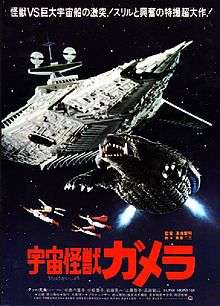Gamera: Super Monster
| Gamera: Super Monster | |
|---|---|
 Gamera: Super Monster (1980) theatrical poster | |
| Directed by | Noriaki Yuasa |
| Produced by |
Masaichi Nagata Hirozaki Ohba Shigeru Shinohara Yasuyoshi Tokuma Masaya Tokuyama |
| Written by | Nisan Takahashi |
| Starring |
Mach Fumiake Yaeko Kojima Yoko Komatsu Keiko Kudo Koichi Maeda Toshie Takada |
| Music by | Shunsuke Kikuchi |
| Cinematography |
Akira Kitazaki Michio Takahashi Akira Uehara |
| Edited by |
Yoshiyuki Miyazaki Tatsuji Nakashizu Shoji Sekiguchi |
Production company | |
| Distributed by | Daiei Film |
Release dates |
|
Running time | 92 minutes |
| Country | Japan |
| Language |
Japanese English |
Gamera: Super Monster (宇宙怪獣ガメラ Uchū Kaijū Gamera, Space Monster Gamera), a 1980 kaiju film, was the final entry in the Shōwa Gamera series, and the last Gamera film written by Nisan Takahashi and directed by Noriaki Yuasa. It relied heavily on stock footage from previous Gamera films. This movie was made when Daiei Film was brought out of bankruptcy by the Tokuma Shoten publishing company. It was intended as a one-shot movie for children. There wasn't another Gamera film for another 15 years, until his revival in 1995.
Plot
When the evil alien Zanon comes to enslave earth, all hope seems lost. The Earth's resident superheroes, the Spacewomen, are powerless to stop him. They must enlist the help of a young boy who has a special connection with the giant turtle Gamera. The Friend of All Children then battles Gyaos (a huge flying vampiric bat/pterosaur), Zigra (an alien shark), Viras (a space squid), Jiger (a giant phehistoric dinosaur), Guiron (a knife-headed extraterrestrial demon beast) and finally Barugon (an enormous lizard whose tongue sprays a freezing liquid that can freeze things solid and a massive back which emits a powerful rainbow energy ray that can melt or dissolve any hard solids). Gamera self-destructs in the end to destroy Zanon once and for all and protect the earth.
Casts[1]
- Mach Fumiake ... Kilara
- Yaeko Kojima ... Marsha
- Yoko Komatsu ... Mitan
- Keiko Kudo ... Giruge
- Koichi Maeda ... Keiichi
- Toshie Takada ... Keiichi's Mother
- Hiroji Hayshi
- Makoto Ikeda
- Kisao Tobita ... Driver
- Osamu Kobayashi ... 'Zanon' Captain (voice)
- Yûzô Hayakawa ... Policeman
- Toru Kawai ... Gamera
- Reiko Tajima ... M38 alien (uncredited)
- Ted Thomas ... Narrator / Policeman (voice) (uncredited)
Production
Every kaiju fought by Gamera in the Showa series appears in this film, by way of stock footage. Subtitles are used to identify each creature (Gyaos, Zigra, Viras, Jiger, Guiron and Barugon) as he fights them. The stock footage takes up about one-third of the film, and only about two minutes' worth of new Gamera footage is included. As Gamera originally fought Guiron on an alien planet (Terra), a plot device was created that allowed Gamera to travel to his enemies' locations.
The movie makes use of pop-culture references, such as an alien spaceship that looks exactly like a Imperial Star Destroyer from Star Wars and the destruction of a billboard advertising a Godzilla film.
This film is one of three Showa era Gamera films that was not acquired and re-dubbed by Sandy Frank, the other two being Gamera vs. Viras and Gamera vs. Jiger.
DVD releases
Elvira's Movie Macabre
The movie was featured on a 1983 episode of Elvira's Movie Macabre, which Shout! Factory released on a DVD in 2007 featuring together with the 1967 British film They Came From Beyond Space. The films can be watched with or without the Elvira host segments.[2][3]
Cinema Insomnia
In 2007, Gamera: Super Monster was shown on the horror hosted television series Cinema Insomnia.[4] Apprehensive Films later released the Cinema Insomnia episode onto DVD in both regular[5] and special "Slime Line" editions.[6]
2010/2011 release
Shout! Factory acquired the rights from Kadokawa Pictures for all eight of the Showa-era Gamera films and has issued the uncut Japanese versions on DVD for the first time in North America. These "Special Edition" DVDs were released in sequential order, starting with Gamera: The Giant Monster (1965) on May 18, 2010.[7] The first sequel, Gamera vs. Barugon (1966) followed on July 6, 2010. The subsequent 6 films followed shortly thereafter released on 3 double-feature DVD sets, and includes every film in the Showa series, with improved sound and picture quality. The first two films are presented only in Japanese, but with an added audio commentary track on each, however there is no English dubbed language tracks on either film. But the other 6 films are presented in both Japanese and English-dubbed formats. (Some films include both the 1960s AIP TV print dubbings as well as the 1987 Sandy Frank redubbed tracks along, with the original Japanese tracks).
References
- ↑ IMDb
- ↑ Elvira's Movie Macabre: Gamera, Super Monster/They Came from Beyond Space : DVD Talk Review of the DVD Video
- ↑ DVD Verdict Review - Elvira's Movie Macabre: Gamera, Super Monsters / They Came From Beyond Space
- ↑ "Cinema Insomnia". Cinema Insomnia. Retrieved 20 July 2010.
- ↑ "Gamera Super Monster DVD". Apprehensive Films. Retrieved 20 July 2010.
- ↑ "Gamera Super Monster Slime Line DVD". Apprehensive Films. Retrieved 20 July 2010.
- ↑ The Colossal Chelonian Lives! Shout! Factory Unleashes GAMERA on DVD!
External links
| Wikiquote has quotations related to: Gamera: Super Monster |
- Gamera web archive (Japanese)
- "宇宙怪獣ガメラ (Uchu Kaijū Gamera)" (in Japanese). Japanese Movie Database. Retrieved 2007-07-19.
- Gamera: Super Monster at the Internet Movie Database